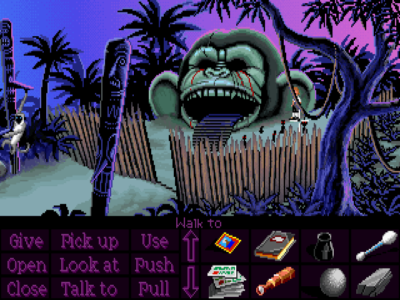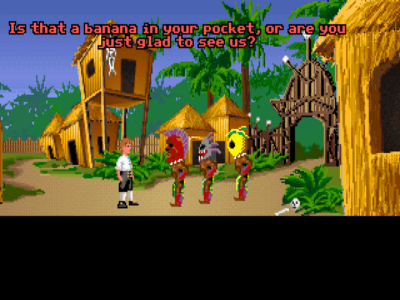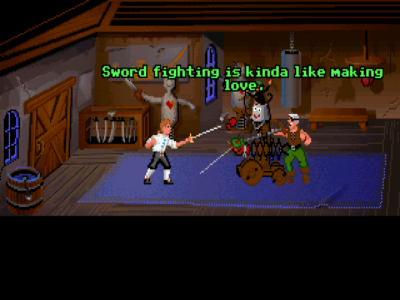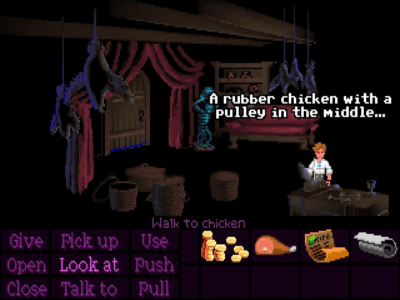
The Secret of Monkey Island
Written by: Rik
Date posted: November 10, 2005
- Genre: Adventure
- Developed by: LucasArts (Lucasfilm Games)
- Published by: LucasArts (Lucasfilm Games)
- Year released: 1990
- Our score: 10
Recently, there’s been a little bit of bleating (from ourselves more than anyone else) about the lack of genuine oldies on FFG. Now, while we’d love to say that it’s because we’ve already covered them all and we’re struggling to find new material, frankly, that’s not the case. We’ve just got busy lives, chock full of social engagements, sporting activites and work commitments. Okay, and we’re a little bit lazy, too. All of which is stating the bleeding obvious when you consider the fact that we haven’t even covered an all-time classic like The Secret of Monkey Island yet.
In fairness, writing about Monkey Island is a bit like scribbling down a few thoughts on the merits of Star Wars – such is its impact and enduring popularity, there’s almost no need to, unless of course you have any startling new perspectives or fundamentally disagree with an overwhelming majority of opinion. Without giving too much away, I don’t have any startling new perspectives, nor do I think the game is in some way undeserving of its stellar reputation. Which is probably why there’s been a look at the series’ possibly under-rated third instalment on FFG for a few years now, but no coverage of the earlier games thus far.
Here it is then, the original pirate-based comedy adventure, in which you take control of Guybrush Threepwood, a young man from the Island of Mêlée who aspires to be a pirate – though he looks more like a flooring inspector. According to the important-looking pirates in the SCUMM bar in town, Guybrush must learn how to fight with a sword, master the art of thievery and, of course, dig up some buried treasure (arr!) before he can consider himself a pirate. But almost as soon as he has proven himself, things take a sinister turn when the beautiful Governor of Mêlée is captured by the evil ghost pirate LeChuck and taken to Monkey Island. LeChuck’s reputation is so fearsome that no pirate on Melee dare confront him, and so Guybrush must assemble a crew, thrash out a deal for one of Stan’s Previously Owned Vessels and head to Monkey Island to rescue the governor. But then, you probably knew all that.
Monkey Island may not have been the first game of its type – we’d had graphic adventures since King’s Quest, including a number of point and clickers – but it had qualities that set it apart from its predecessors. From a personal point of view, it was the game that made me want to play games. Where other adventures may have been initially impressive – especially their movie-style intros – they were never more than mildly diverting. It only took a fiendishly difficult puzzle, a time-related challenge, the possibility of death, or, worst of all, the realisation that progress was now impossible due to the absence of an object I’d forgotten to pick up earlier on in the game to put me off. Monkey Island, on the other hand, kept things simple – the focus was on the puzzles, you couldn’t die (unless you forgot that Guybrush can only hold his breath for fifteen minutes) and there were no dodgy arcade sections. The result was a game that had me hooked; this was one adventure I definitely had to finish.

Yep – you have to step into that giant monkey head. After you open it by sticking a huge cotton bud in its ear…
Moreover, it felt like Monkey Island wanted me to finish it. You see, while Splinter Cell aficionados lap up the tension, some people (like me) prefer a slightly more relaxed experience, where you don’t have to save around every corner and fear death at every turn. Of course, you could make the point that the linear and essentially straightforward nature of point and click adventures was probably one of the main reasons why the genre eventually died out. As Stoo says elsewhere on this site, you’re basically just clicking on various bits of the screen while enjoying the story. Well, that’s one way of looking at things. On the other hand, you could take the view that it’s nice to play a game which relies on a good story and a little problem solving to entertain rather than the opportunity to leap from the shadows and break someone’s neck. And as for replayability, adventures may not offer too much challenge second time around, but isn’t that the same with any game once you know what you’re doing? And when the story and script are as entertaining as in Monkey Island, another go is a pleasure, not a chore.
Speaking of which, it’s actually been a while since I last played this game – I certainly haven’t in the last five years, anyway. Coming back to it after such a long time not only allowed for a reasonably fresh perspective on its merits as a game, but it also meant that I didn’t automatically know the solution to every puzzle, or the punchline to every joke. Consequently, I had an absolute blast playing it: of course, I had vague ideas about what to do at various points, but most of the time I had to work it out for myself rather than relying on fading and sketchy memories to get to the end. And once I did finish it (and bearing in mind my previous comments, it’s difficult to disregard nostalgia completely on this one) it was difficult to come to anything other than the conclusion that Monkey Island is still one of the greatest games I’ve ever played.
Okay, it may not be any great shakes in the audio-visual department any more. But the characters and scenery are well drawn, display remarkable attention to detail (there are great little touches on show throughout the game) and, most importantly, retain their original cartoony charm which in a way makes them more appealing than the digitised faces and lifelike movement that frequently appear in modern gaming. Sound-wise, Monkey Island was pre-talkie, but it’s arguable that the some of the deadpan humour works better in text rather than voice form. And of course, the music is great, with the main theme possibly the most memorable of all computer-game theme tunes. On the version I had for review, the music was streamed from the CD, but I’m pretty sure the MIDI versions were as good, if not better than those on the re-issue (and they didn’t slow the bloody game down every time you walked to a new location, either).
Of course, what really makes the game so enjoyable is the sublime combination of a funny, well-written script (for when you’re sitting back and watching) with ingenious, well thought-out puzzles (for when you’re actually playing). Monkey Island has long been held up as an example of a funny game, but it possibly succeeds in this regard because it maintains a sharp, laconic tone throughout rather than aiming for laugh-out-loud moments. It’s not all down to the script either – there are some great visual gags, too (like when you keep escaping from the Monkey Island cannibals’ prison hut).
But what really struck me about the game this time around was just how good the various puzzles were. As someone fairly used to adventure-game clichés, it was surprising to face situations where it wasn’t all about using one object on another. In particular, the dialogue-based puzzles are impressive: everyone knows about the sword-fighting (which was pretty straightforward to me until I got to the sword master and actually had to think about the responses to her insults), but there are other examples, such as the time when you have to negotiate with Stan over the sale of one of his ships. Idly clicking on dialogue options until the “correct” route makes itself apparent won’t suffice here – you actually have to do a bit more than that before he’ll make the sale for the money you’re offering. It’s things like this which elevate The Secret of Monkey Island above the rest.
I’ve noticed recently that Stoo seems to make an apology if he feels he’s written short review. Frankly, these are all about the same length as my standard efforts, but I’m not about to start feeling bad about it now. Besides, there seems little point in ranting on about hidden depths it doesn’t have, great game as it is. If I was to mention a criticism, then it would possibly be that the early capering with the numerous inhabitants of Mêlée Island is a little bit more entertaining than rowing around Monkey Island with only Herman Toothrot for company towards the end (although the cannibals are great, too). But I’m nit-picking, really. The Secret of Monkey Island is one of the gaming greats, a humorous, well-paced adventure that remains as relevant and as entertaining today (if not so gob-smackingly impressive) as it was fifteen years ago. And yes, it gets top marks – and I’m not even going to rationalise it.





 Posts
Posts